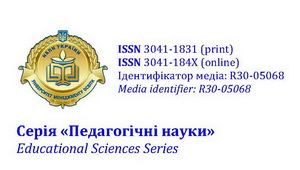The future of holistic education: trends and predictions
Анотація
Ключові слова
Повний текст:
PDF (English)Посилання
REFERENCES / СПИСОК ВИКОРИСТАНИХ ДЖЕРЕЛ
M. Montessori, The Montessori Method. Schocken Books, 1964.
R. Steiner, The Education of the Child: And Early Lectures on Education. Anthroposophic Press, 1995. [Online]. Available: https://www.arvindguptatoys.com/arvindgupta/steiner-education.pdf Application date: January 05, 2025.
C. R. Rogers, Freedom to Learn. Merrill Publishing Company, 1969.
A. H. Maslow, “A Theory of Human Motivation», Psychological Review, vol. 50, is. 4, p. 370–396. 1943. http://dx.doi.org/10.1037/h0054346
C. Dede, «Immersive Interfaces for Engagement and Learning», Science, vol. 323, is. 5910, p. 66–69, 2009. [Online]. Available: https://muve.gse.harvard.edu/sites/g/files/omnuum5026/files/rivercityproject/files/dede_immersive_interfaces.pdf Application date: January 05, 2025.
D. Goleman, Emotional Intelligence: Why It Can Matter More Than IQ. Bantam Books,1995.
M. K. Galloway, J. Conner, & D. Pope, «Nonacademic effects of homework in privileged, high-performing high schools», The Journal of Experimental Education, vol. 81, is. 4, р. 492–510, 2013. http://dx.doi.org/10.1080/00220973.2012.745469
The IB education system recognized in a case study about holistic student development. International Baccalaureate Organization. [Online]. Available: https://www.ibo.org/contact-the-ib/media-resources/media-releases/the-ib-education-system-recognized-in-a-case-study-about-holistic-student-development/ Application date: January 05, 2025.
Why Parents Should Consider IB Schools for Their Kids. Holistic education. Knowledgeum Academy. [Online]. Available: https://www.knowledgeumacademy.in/blogs/why-parents-should-consider-ib-schools-for-their-kids#:~:text=Holistic%20Education%3A%20IB%20schools%20are,a%20global%20view%20of%20things Application date: January 05, 2025.
R. J. Marzano, What works in schools: Facilitator's Guide. ASCD: Alexandria, Virginia, 2003. [Online]. Available: https://files.ascd.org/staticfiles/ascd/pdf/siteASCD/video/WhatWorksinSchools.pdf Application date: January 05, 2025.
Reggio Emilia Approach and Its Benefits. Mulberry Learning. [Online]. Available: https://mulberrylearning.com/reggio-emilia-approach-and-its-benefits Application date: January 05, 2025.
A. C. Ornstein, & F. P. Hunkins, Curriculum: Foundations, Principles, and Issues; 7th ed. Pearson Education, 2017. [Online]. Available: https://daneshnamehicsa.ir/userfiles/file/manabeh/francis_p_hunkins_allan_c_ornstein.pdf Application date: January 05, 2025.
W. J. Popham, The truth about testing: An educator’s call to action. Internet Archive. 2001. [Online]. Available: https://archive.org/details/truthabouttestin00wjam_0/page/n1/mode/2up Application date: January 05, 2025.
Waldorf Education. AWSNA. [Online]. Available: https://www.waldorfeducation.org/waldorf-education Application date: January 05, 2025.
Waldorf education. From Wikipedia, the free encyclopedia. [Online]. Available: https://en.wikipedia.org/wiki/Waldorf_education Application date: January 05, 2025.
TRANSLATED AND TRANSLITERATED / ПЕРЕКЛАД, ТРАНСЛІТЕРАЦІЯ
M. Montessori, The Montessori Method. Schocken Books, 1964. (in English).
R. Steiner, The Education of the Child: And Early Lectures on Education. Anthroposophic Press, 1995. [Online]. Available: https://www.arvindguptatoys.com/arvindgupta/steiner-education.pdf Application date: January 05, 2025. (in English).
C. R. Rogers, Freedom to Learn. Merrill Publishing Company, 1969. (in English).
A. H. Maslow, “A Theory of Human Motivation», Psychological Review, vol. 50, is. 4, p. 370–396. 1943. http://dx.doi.org/10.1037/h0054346 (in English).
C. Dede, «Immersive Interfaces for Engagement and Learning», Science, vol. 323, is. 5910, p. 66–69, 2009. [Online]. Available: https://muve.gse.harvard.edu/sites/g/files/omnuum5026/files/rivercityproject/files/dede_immersive_interfaces.pdf Application date: January 05, 2025. (in English).
D. Goleman, Emotional Intelligence: Why It Can Matter More Than IQ. Bantam Books,1995. (in English).
M. K. Galloway, J. Conner, & D. Pope, «Nonacademic effects of homework in privileged, high-performing high schools», The Journal of Experimental Education, vol. 81, is. 4, р. 492–510, 2013. http://dx.doi.org/10.1080/00220973.2012.745469 (in English).
The IB education system recognized in a case study about holistic student development. International Baccalaureate Organization. [Online]. Available: https://www.ibo.org/contact-the-ib/media-resources/media-releases/the-ib-education-system-recognized-in-a-case-study-about-holistic-student-development/ Application date: January 05, 2025. (in English).
Why Parents Should Consider IB Schools for Their Kids. Holistic education. Knowledgeum Academy. [Online]. Available: https://www.knowledgeumacademy.in/blogs/why-parents-should-consider-ib-schools-for-their-kids#:~:text=Holistic%20Education%3A%20IB%20schools%20are,a%20global%20view%20of%20things Application date: January 05, 2025. (in English).
R. J. Marzano, What works in schools: Facilitator's Guide. ASCD: Alexandria, Virginia, 2003. [Online]. Available: https://files.ascd.org/staticfiles/ascd/pdf/siteASCD/video/WhatWorksinSchools.pdf Application date: January 05, 2025. (in English).
Reggio Emilia Approach and Its Benefits. Mulberry Learning. [Online]. Available: https://mulberrylearning.com/reggio-emilia-approach-and-its-benefits Application date: January 05, 2025. (in English).
A. C. Ornstein, & F. P. Hunkins, Curriculum: Foundations, Principles, and Issues; 7th ed. Pearson Education, 2017. [Online]. Available: https://daneshnamehicsa.ir/userfiles/file/manabeh/francis_p_hunkins_allan_c_ornstein.pdf Application date: January 05, 2025. (in English).
W. J. Popham, The truth about testing: An educator’s call to action. Internet Archive. 2001. [Online]. Available: https://archive.org/details/truthabouttestin00wjam_0/page/n1/mode/2up Application date: January 05, 2025. (in English).
Waldorf Education. AWSNA. [Online]. Available: https://www.waldorfeducation.org/waldorf-education Application date: January 05, 2025. (in English).
Waldorf education. From Wikipedia, the free encyclopedia. [Online]. Available: https://en.wikipedia.org/wiki/Waldorf_education Application date: January 05, 2025. (in English).
Посилання
- Поки немає зовнішніх посилань.
